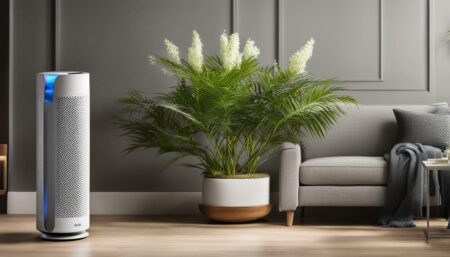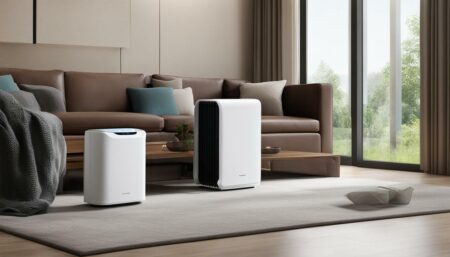Welcome to our comprehensive guide to air purifiers and their numerous benefits for your health and well-being. If you’re considering investing in an air purifier, or want to learn more about the advantages of these devices, you’ve come to the right place. In this section, we’ll explore how air purifiers can improve your life and provide you with the knowledge you need to make an informed decision.
Key Takeaways:
- Air purifiers can improve the air quality in your home and promote better overall health.
- These devices are effective at removing allergens, dust, and other pollutants from indoor air.
- Choosing the right air purifier based on room size and filtration technology is essential for optimal performance.
- Maintaining and cleaning your air purifier regularly is crucial for ensuring long-lasting benefits.
- Additional practices, such as proper ventilation and eliminating chemical products, can further enhance air quality in your home.
Understanding Indoor Air Quality
Indoor air quality refers to the level of pollutants present in the air inside a building. Poor indoor air quality can have a significant impact on your health, leading to respiratory issues, allergies, and other health problems. According to the Environmental Protection Agency (EPA), indoor air quality can be up to five times worse than outdoor air quality, making it crucial to take steps to improve your indoor air quality.
Common pollutants found in indoor air include dust, mold, pet dander, and volatile organic compounds (VOCs) emitted from household cleaning products, paints, and other materials. Exposure to these pollutants can cause a range of health problems, particularly for vulnerable populations such as children, elderly individuals, and those with pre-existing respiratory conditions.
Air purifiers can help improve indoor air quality by filtering out these pollutants, creating a cleaner and healthier environment. By removing harmful airborne particles from the air, air purifiers can help reduce the risk of respiratory issues and allergies, leading to a better quality of life.

Investing in an air purifier can provide numerous health benefits, including improved respiratory health, allergen reduction, and better sleep quality. In the next section, we will explore these benefits in more detail and show how air purifiers can contribute to a healthier living environment.
Allergen Reduction and Asthma Relief
If you or someone in your household suffers from allergies or asthma, air purifiers can be a game-changer. These devices effectively reduce the presence of allergens, providing relief for those who experience respiratory irritation and difficulty breathing.
Dust mites, pet dander, pollen, and mold spores are common allergens found in indoor air. When inhaled, they can trigger allergy symptoms and asthma attacks. Air purifiers work by filtering out these irritants, capturing them within the device’s filters.
HEPA filters are particularly effective in removing these allergens from the air. These filters are capable of capturing particles as small as 0.3 microns, making them highly effective at trapping most allergens. As a result, air purifiers with HEPA filters can significantly reduce the presence of these irritants in the air, providing relief for allergy and asthma sufferers.
According to the American Lung Association, air purifiers can help improve indoor air quality, which can lead to a reduction in respiratory symptoms. In addition, the use of air purifiers can help reduce the need for medication and visits to the doctor for allergy and asthma sufferers.
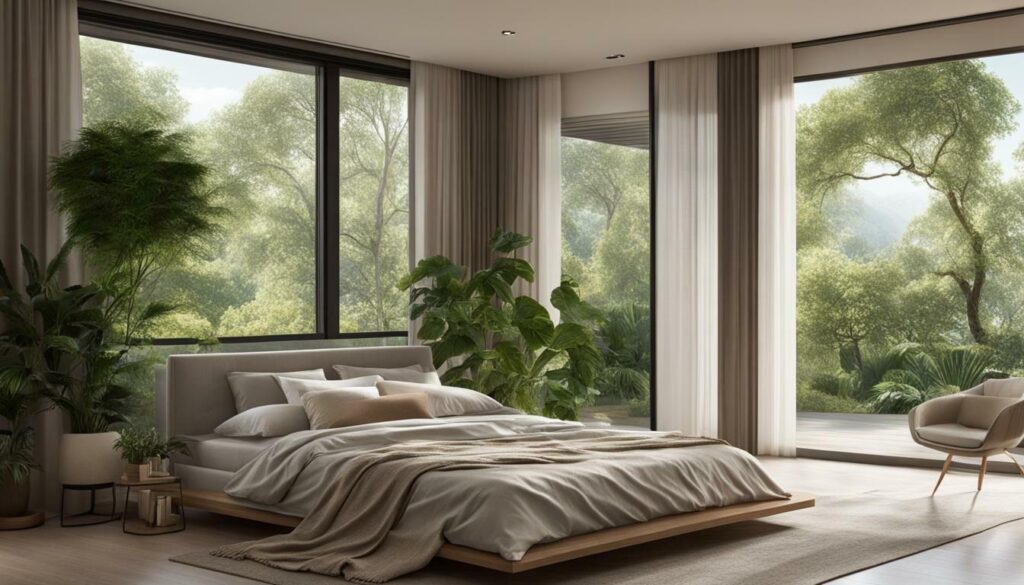
Odor Elimination
One of the significant benefits of air purifiers is their ability to eliminate unpleasant odors in your home. Whether it’s cooking smells, pet odors, or tobacco smoke, air purifiers can effectively neutralize and eliminate these odors, leaving your home smelling fresh and clean.
The technology behind odor elimination varies depending on the type of air purifier. Some models use activated carbon filters, which absorb and trap odors. Others use ionizers to neutralize and eliminate odor-causing particles. Whatever the technology, the result is an odor-free environment that is both pleasant and healthy.
In addition to improving the overall ambiance of your home, odor elimination can have a positive impact on your health and well-being. Studies have shown that exposure to unpleasant odors can contribute to stress and anxiety, leading to adverse effects on mental and physical health over time. By eliminating these odors, air purifiers can create a more relaxing, stress-free environment that is conducive to a healthy lifestyle.
Investing in an air purifier with odor elimination capabilities can make a significant difference in the quality of your home environment, particularly if you have pets or are sensitive to certain smells. With the right air purifier, you can enjoy the benefits of a fresh, clean-smelling home while reaping the numerous health benefits associated with air purification.
Dust and Pollen Removal: Air Purifier Benefits
If you or someone in your household suffers from allergies or respiratory sensitivities, you likely understand the importance of reducing dust and pollen particles in the air. Air purifiers can effectively capture and remove these irritants, leading to improved indoor air quality and a healthier living environment.
Many air purifiers utilize HEPA (High-Efficiency Particulate Air) filters, which are designed to trap small particles such as dust, pollen, and other allergens. These filters work by forcing air through a fine mesh that traps the particles, resulting in cleaner air in the room.
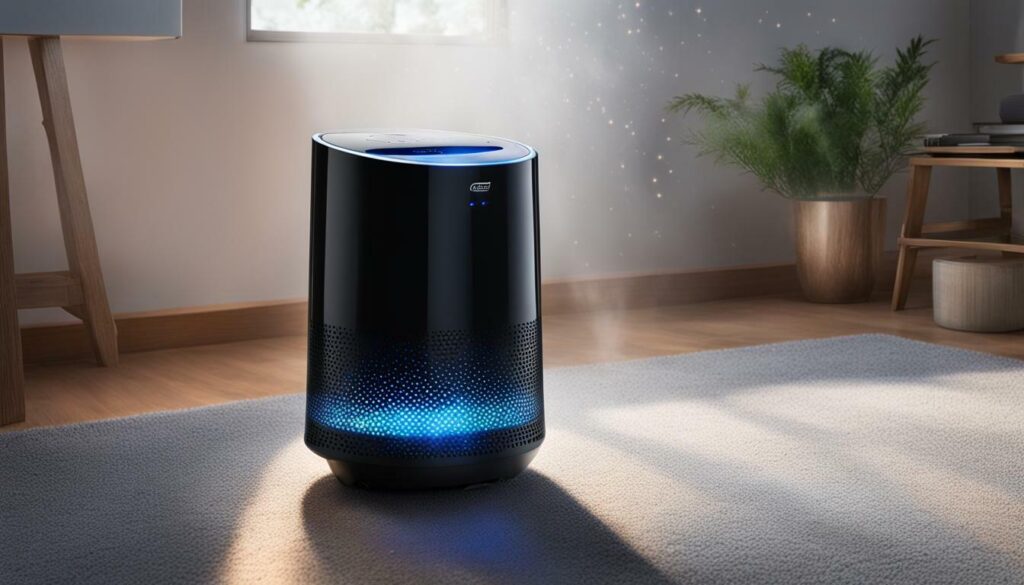
Some air purifiers also use activated carbon filters, which can help remove odors and volatile organic compounds (VOCs) from the air. This can be particularly beneficial for those with allergies or sensitivities to chemical fragrances.
In addition to capturing pollutants in the air, air purifiers can also help prevent them from settling on surfaces such as furniture and floors. This can make cleaning easier and provide additional relief for those with allergies or respiratory sensitivities.
Investing in an air purifier with dust and pollen removal capabilities can provide numerous benefits for your health and overall well-being. Consider adding one to your home today.
Improved Respiratory Health
Air purifiers can be particularly beneficial for individuals with respiratory issues. By eliminating harmful particles from the air, these devices can contribute to improved respiratory health. Research has shown that air purifiers can help reduce symptoms such as coughing, wheezing, and shortness of breath.
For individuals with asthma, air purifiers can provide relief by decreasing exposure to irritants such as dust mites, pet dander, and pollen. This can help prevent asthma attacks and reduce the need for medication.
By removing pollutants from the air, air purifiers can also help prevent respiratory infections and diseases. Harmful pathogens and bacteria that may cause respiratory illnesses can be effectively captured and neutralized by air purifiers.
Investing in an air purifier can be a proactive step towards improving your respiratory health and overall well-being.
Better Sleep with Air Purifiers
If you struggle with sleep issues such as snoring, nighttime allergies, or simply have trouble falling asleep, an air purifier may be the solution you need. By removing allergens and other pollutants from the air, air purifiers create a cleaner and healthier sleeping environment.
Research has shown that exposure to airborne pollutants can disrupt sleep patterns and lead to a range of health issues. By using an air purifier, you can reduce the levels of these pollutants in your bedroom and improve the overall quality of your sleep.
Aside from reducing allergens and pollutants, some air purifiers also include white noise features which can help you fall asleep more easily by masking distracting sounds. Additionally, some models have programmable settings that allow you to schedule the air purifier to turn on and off according to your sleep schedule.
Investing in an air purifier can be a game-changer for those who struggle with sleep issues. Not only can it lead to a more restful night’s sleep, but it can also improve your overall health and well-being.
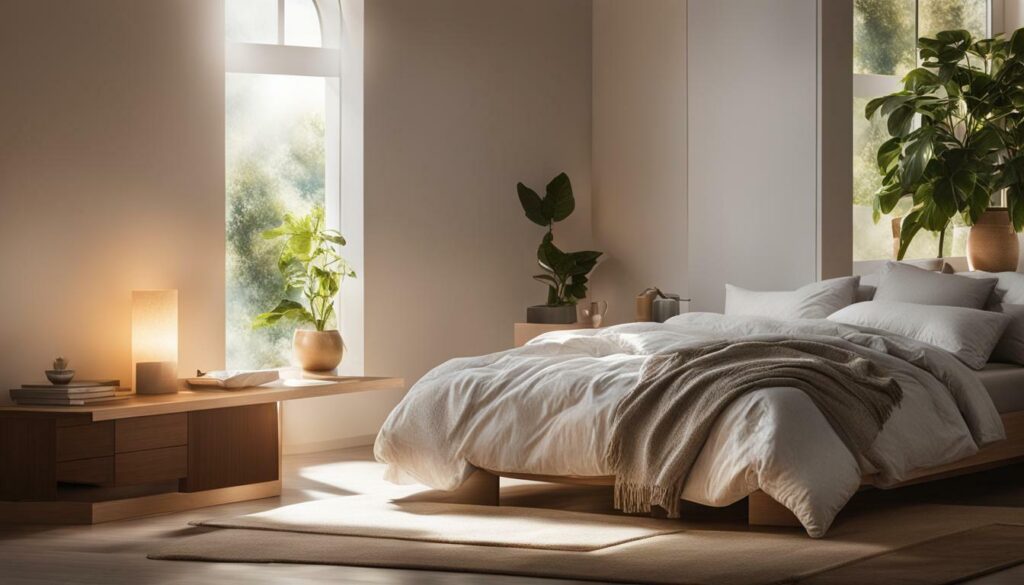
Remember, air purifiers are not a magic solution to all sleep problems. It is important to maintain other healthy sleep habits, such as avoiding caffeine before bed, maintaining a consistent sleep schedule, and ensuring your bedroom is cool, quiet, and dark. But with the added benefits of an air purifier, you can create an optimal environment for a great night’s sleep.
If you’re interested in exploring the benefits of air purifiers for better sleep, be sure to consider the factors discussed in the previous sections when choosing the right model for you.
Choosing the Right Air Purifier
When it comes to selecting an air purifier, there are several factors to consider to ensure you choose the right one for your needs. Here are some tips:
| Factor | Consideration |
|---|---|
| Room size | Make sure you choose an air purifier that is suitable for the size of your room. Check the manufacturer’s specifications to determine the appropriate room size for the device. |
| Filtration technology | Consider the different types of filtration technologies available, such as HEPA, activated carbon, or UV-C light. Research the pros and cons of each type to determine which is best for your specific needs. |
| Maintenance requirements | Check the maintenance requirements of the air purifier. Some devices require more frequent filter replacements or cleaning than others. Make sure you are willing and able to commit to the necessary maintenance. |
There are several types of air purifiers available on the market, including portable and whole-house units. Portable air purifiers are more common and can be moved from room to room, while whole-house units are installed into your home’s heating and cooling system and purify the air throughout the entire home.
When choosing an air purifier, it’s important to keep in mind the specific benefits you are looking to gain. For example, if you are seeking allergen relief, look for a device that specifically targets allergens. If you are concerned about reducing airborne diseases, select a model that uses UV-C light technology to neutralize harmful pathogens.
Investing in the right air purifier can have a significant impact on your overall health and well-being. By reducing the presence of airborne pollutants, you can enjoy a cleaner and safer living environment.
Choosing the Right Air Purifier
If you’re considering investing in an air purifier, choosing the right one can be a daunting task. With so many options available on the market, it’s important to consider a few key factors before making a purchase.
The first factor to consider is the size of the room where you plan to use the air purifier. Make sure to choose a device that is appropriately sized for the room, as using an air purifier that is too small for the space will not effectively filter the air. On the other hand, using an air purifier that is too large for the room can waste energy and money.
Another important consideration is the type of filtration technology used in the air purifier. HEPA filters are the most effective at removing airborne particles, but other types of filters such as activated carbon and UV-C can be useful for neutralizing odors and killing germs and bacteria.
It’s also essential to consider the maintenance requirements of the air purifier. Some models require frequent filter replacements or other maintenance tasks, while others have washable or reusable filters. Make sure to choose a device that fits your budget and maintenance abilities.

Lastly, look for additional features that may be useful for your specific needs, such as noise level, portability, and smart technology capabilities. By considering these factors, you can choose an air purifier that will provide the most significant health benefits for you and your family.
Section 10: Maintaining and Cleaning Your Air Purifier for Longevity and Optimal Performance
To ensure your air purifier continues to perform at its best, it’s important to maintain and clean it regularly. By doing so, you’ll not only extend the life of your device but also improve its overall effectiveness in purifying the air in your home. Here are some tips to help you keep your air purifier in top shape:
Regular Cleaning Schedule
Check the user manual for your specific air purifier model for the recommended cleaning schedule. Generally, it’s good practice to clean your air purifier at least once a month. If you use your air purifier more frequently or have pets in the home, it may require more frequent cleaning.
Filter Replacement
Most air purifiers have filters that require replacement periodically. The frequency of filter replacement will depend on the specific model and usage. Refer to the user manual for guidance on how often to replace the filter. It’s important to replace the filter on time to maintain the effectiveness of your air purifier.
Cleaning the Exterior
Regularly wiping down the exterior of your air purifier with a damp cloth can prevent dirt and dust buildup, which can impede its performance. Be sure to unplug the device before cleaning and avoid exposing the electronic components to moisture.
Cleaning the Interior
The interior of your air purifier can also accumulate dust and debris over time. Follow the manufacturer’s instructions to open up the unit and clean the inside components. Be sure to do this carefully and avoid damaging any parts.
Replacing UV-C Bulbs
Some air purifiers use UV-C bulbs to eliminate bacteria and viruses. These bulbs will eventually need replacement, usually between 6-12 months. Check the user manual for your specific model to see if it uses UV-C bulbs and how often they need to be replaced.
By following these tips, you can ensure your air purifier continues to provide clean and fresh air for years to come. Don’t forget to check the manual for your specific model for its maintenance requirements to ensure optimal performance.
Additional Tips for Clean Air
Besides using an air purifier, there are other practices you can implement to improve the air quality in your home. Consider the following tips:
- Ventilation: Proper ventilation is key to maintaining clean indoor air. Open windows and doors on mild weather days to let in fresh air.
- Cleaning: Regular cleaning routines can help eliminate dust, pet dander, and other airborne irritants. Be sure to vacuum floors and carpets, dust surfaces, and mop hard floors.
- Minimize chemical products: Certain cleaning products, air fresheners, and pesticides can release harmful chemicals into the air. Opt for natural or fragrance-free alternatives whenever possible.
- Humidity: Keeping humidity levels between 30-50% can help prevent the growth of mold, which can trigger allergies and respiratory issues.
By incorporating these habits into your routine, you can complement the benefits of your air purifier and create a healthier living environment for you and your family.
Conclusion
In conclusion, air purifiers offer numerous benefits that can significantly improve your overall health and well-being. By effectively reducing common indoor pollutants such as allergens, dust, and odors, air purifiers can create a cleaner and healthier environment for you and your family.
With the potential to alleviate respiratory symptoms, improve sleep quality, and reduce the spread of airborne diseases, air purifiers are a worthwhile investment for anyone looking to enhance their indoor air quality.
When choosing an air purifier, consider factors such as room size and filtration technology to select the best one for your needs. Additionally, be sure to properly maintain and clean your air purifier to ensure optimal performance and longevity.
By complementing the use of an air purifier with proper ventilation and regular cleaning routines, you can further improve the air quality in your home.
Investing in an air purifier may seem like a small change, but it can make a big difference in your health and quality of life. So why not take the first step towards a cleaner and healthier living environment today?
FAQ
Q: What are the health benefits of air purifiers?
A: Air purifiers can improve overall well-being by reducing allergens, eliminating odors, removing dust and pollen, improving respiratory health, promoting better sleep, reducing the spread of airborne diseases, and creating a healthier indoor environment.
Q: How do air purifiers improve indoor air quality?
A: Air purifiers help reduce the presence of common pollutants found in indoor air, such as dust, pet dander, pollen, mold spores, and airborne chemicals. They filter out these contaminants, improving the quality of the air you breathe.
Q: Can air purifiers help with allergies and asthma?
A: Yes, air purifiers can effectively reduce allergens in the home, providing relief for allergy sufferers and those with asthma. They filter out irritants like dust mites, pet dander, pollen, and mold spores, creating a more allergen-free environment.
Q: Do air purifiers eliminate odors?
A: Air purifiers can eliminate unpleasant odors, including cooking smells, pet odors, and tobacco smoke. Different technologies are used in air purifiers to neutralize and eliminate odors effectively.
Q: How do air purifiers remove dust and pollen?
A: Air purifiers can effectively capture and remove dust and pollen particles from the air, benefiting those with allergies or respiratory sensitivities. Through their filtration systems, they can help reduce the presence of these airborne irritants.
Q: Can air purifiers improve respiratory health?
A: Yes, air purifiers can contribute to improved respiratory health by potentially reducing symptoms and conditions such as coughing, wheezing, and shortness of breath. They create a cleaner and healthier indoor environment, promoting better breathing.
Q: Do air purifiers enhance sleep quality?
A: Air purifiers can enhance sleep quality by creating a clean and allergen-free sleeping environment. Reduced snoring, fewer nighttime allergies, and overall improved sleep are some potential benefits of using air purifiers.
Q: Can air purifiers reduce the spread of airborne diseases?
A: Yes, air purifiers can help reduce the spread of airborne diseases by capturing and neutralizing harmful pathogens and bacteria. They act as an added layer of protection, improving the overall health and well-being of your household.
Q: What factors should I consider when choosing an air purifier?
A: When choosing an air purifier, consider factors such as room size, filtration technology, and maintenance requirements. There are different types of air purifiers available, so selecting the best one for your needs is essential.
Q: How do I maintain and clean my air purifier?
A: To ensure optimal performance and longevity, it’s important to maintain and clean your air purifier properly. Follow recommended cleaning schedules, replace filters as needed, and perform other maintenance tasks outlined in the manufacturer’s instructions.
Q: Are there any additional tips to improve air quality?
A: Yes, in addition to using an air purifier, you can improve air quality by practicing proper ventilation, regular cleaning routines, and minimizing the use of chemical products. These habits can complement the benefits of an air purifier.




